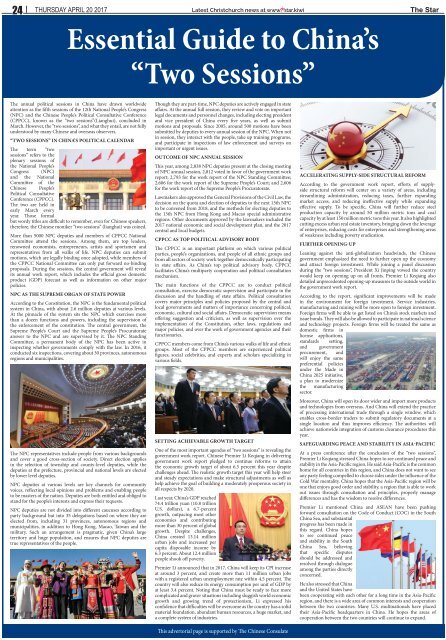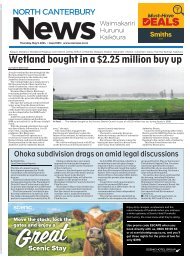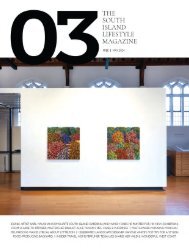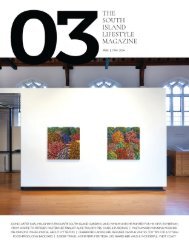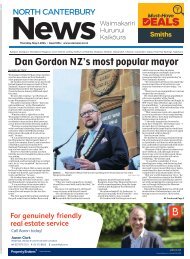The Star: April 20, 2017
You also want an ePaper? Increase the reach of your titles
YUMPU automatically turns print PDFs into web optimized ePapers that Google loves.
24 Thursday <strong>April</strong> <strong>20</strong> <strong>20</strong>17<br />
Latest Christchurch news at www. .kiwi<br />
<strong>The</strong> <strong>Star</strong><br />
Essential Guide to China’s<br />
“Two Sessions”<br />
<strong>The</strong> annual political sessions in China have drawn worldwide<br />
attention as the fifth sessions of the 12th National People’s Congress<br />
(NPC) and the Chinese People’s Political Consultative Conference<br />
(CPPCC), known as the “two sessions”(Lianghui), concluded in<br />
March. However, the “two sessions”, and what they entail, are not fully<br />
understood by many Chinese and overseas observers.<br />
“TWO SESSIONS” IN CHINA’S POLITICAL CALENDAR<br />
<strong>The</strong> term “two<br />
sessions” refers to the<br />
plenary sessions of<br />
the National People’s<br />
Congress (NPC)<br />
and the National<br />
Committee of the<br />
Chinese People’s<br />
Political Consultative<br />
Conference (CPPCC).<br />
<strong>The</strong> two are held in<br />
early March every<br />
year. Those formal<br />
but wordy titles are difficult to remember, even for Chinese speakers,<br />
therefore, the Chinese moniker “two sessions” (lianghui) was coined.<br />
More than 5000 NPC deputies and members of CPPCC National<br />
Committee attend the sessions. Among them, are top leaders,<br />
renowned economists, entrepreneurs, artists and sportsmen and<br />
representatives from all walks of life. NPC deputies can submit<br />
motions, which are legally binding once adopted, while members of<br />
the CPPCC National Committee can only put forward no-binding<br />
proposals. During the sessions, the central government will reveal<br />
its annual work report, which includes the official gross domestic<br />
product (GDP) forecast as well as information on other major<br />
policies.<br />
NPC AS THE SuPREmE ORgAN Of STATE POWER<br />
According to the Constitution, the NPC is the fundamental political<br />
system in China, with about 2.6 million deputies at various levels.<br />
At the pinnacle of the system sits the NPC which exercises more<br />
than a dozen functions and powers, including the supervision of<br />
the enforcement of the constitution. <strong>The</strong> central government, the<br />
Supreme People’s Court and the Supreme People’s Procuratorate<br />
answer to the NPC and are supervised by it. <strong>The</strong> NPC Standing<br />
Committee, a permanent body of the NPC has been active in<br />
inspecting whether governments comply with the law. In <strong>20</strong>16, it<br />
conducted six inspections, covering about 30 provinces, autonomous<br />
regions and municipalities.<br />
<strong>The</strong> NPC representatives include people from various backgrounds<br />
and cover a good cross-section of society. Direct election applies<br />
in the selection of township and county-level deputies, while the<br />
deputies at the prefecture, provincial and national levels are elected<br />
by lower level deputies.<br />
NPC deputies at various levels are key channels for community<br />
voices, reflecting local opinions and problems and enabling people<br />
to be masters of the nation. Deputies are both entitled and obliged to<br />
stand for the people’s interests and express their requests.<br />
NPC deputies are not divided into different caucuses according to<br />
party background but into 35 delegations based on where they are<br />
elected from, including 31 provinces, autonomous regions and<br />
municipalities, in addition to Hong Kong, Macao, Taiwan and the<br />
military. Such an arrangement is pragmatic, given China’s large<br />
territory and huge population, and ensures that NPC deputies are<br />
true representatives of the people.<br />
Though they are part-time, NPC deputies are actively engaged in state<br />
affairs. At the annual full session, they review and vote on important<br />
legal documents and personnel changes, including electing president<br />
and vice president of China every five years, as well as submit<br />
motions and proposals. Since <strong>20</strong>05, around 500 motions have been<br />
submitted by deputies to every annual session of the NPC. When not<br />
in session, they interact with the people, take up training programs,<br />
and participate in inspections of law enforcement and surveys on<br />
important or urgent issues.<br />
OuTCOmE Of NPC ANNuAL SESSION<br />
This year, among 2,838 NPC deputies present at the closing meeting<br />
of NPC annual session, 2,812 voted in favor of the government work<br />
report; 2,793 for the work report of the NPC Standing Committee;<br />
2,606 for the work report of the Supreme People’s Court; and 2,606<br />
for the work report of the Supreme People’s Procuratorate.<br />
Lawmakers also approved the General Provisions of the Civil Law, the<br />
decision on the quota and election of deputies to the next 13th NPC<br />
to be convened from <strong>20</strong>18, and the methods for electing deputies to<br />
the 13th NPC from Hong Kong and Macao special administrative<br />
regions. Other documents approved by the lawmakers included the<br />
<strong>20</strong>17 national economic and social development plan, and the <strong>20</strong>17<br />
central and local budgets.<br />
CPPCC AS TOP POLITICAL ADvISORy bODy<br />
<strong>The</strong> CPPCC is an important platform on which various political<br />
parties, people’s organizations, and people of all ethnic groups and<br />
from all sectors of society work together democratically participating<br />
in state affairs. As China’s top political advisory body, CPPCC<br />
facilitates China’s multiparty cooperation and political consultation<br />
mechanism.<br />
<strong>The</strong> main functions of the CPPCC are to conduct political<br />
consultation, exercise democratic supervision and participate in the<br />
discussion and the handling of state affairs. Political consultation<br />
covers major principles and policies proposed by the central and<br />
local governments and matters of importance concerning political,<br />
economic, cultural and social affairs. Democratic supervision means<br />
offering suggestion and criticism, as well as supervision over the<br />
implementation of the Constitution, other laws, regulations and<br />
major policies, and over the work of government agencies and their<br />
functionaries.<br />
CPPCC members come from China’s various walks of life and ethnic<br />
groups. Most of the CPPCC members are experienced political<br />
figures, social celebrities, and experts and scholars specializing in<br />
various fields.<br />
SETTINg ACHIEvAbLE gROWTH TARgET<br />
One of the most important agendas of “two sessions” is revealing the<br />
government work report. Chinese Premier Li Keqiang in delivering<br />
government work report pledged to continue reforms to attain<br />
the economic growth target of about 6.5 percent this year despite<br />
challenges ahead. <strong>The</strong> realistic growth target this year will help steer<br />
and steady expectations and make structural adjustments as well as<br />
help achieve the goal of building a moderately prosperous society in<br />
all respects by <strong>20</strong><strong>20</strong>.<br />
Last year, China’s GDP reached<br />
74.4 trillion yuan (10.8 trillion<br />
U.S. dollars), a 6.7-percent<br />
growth, outpacing most other<br />
economies and contributing<br />
more than 30 percent of global<br />
growth. Despite challenges,<br />
China created 13.14 million<br />
urban jobs and increased per<br />
capita disposable income by<br />
6.3 percent. About 12.4 million<br />
people shook off poverty.<br />
Premier Li announced that in <strong>20</strong>17, China will keep its CPI increase<br />
at around 3 percent, and create more than 11 million urban jobs<br />
with a registered urban unemployment rate within 4.5 percent. <strong>The</strong><br />
country will also reduce its energy consumption per unit of GDP by<br />
at least 3.4 percent. Noting that China must be ready to face more<br />
complicated and graver situations including sluggish world economic<br />
growth and growing trend of protectionism, Li expressed his<br />
confidence that difficulties will be overcome as the country has a solid<br />
material foundation, abundant human resources, a huge market, and<br />
a complete system of industries.<br />
This advertorial page is supported by <strong>The</strong> Chinese Consulate<br />
ACCELERATINg SuPPLy-SIDE STRuCTuRAL REfORm<br />
According to the government work report, efforts of supplyside<br />
structural reform will center on a variety of areas, including<br />
streamlining administration, reducing taxes, further expanding<br />
market access, and reducing ineffective supply while expanding<br />
effective supply. To be specific, China will further reduce steel<br />
production capacity by around 50 million metric tons and coal<br />
capacity by at least 150 million metric tons this year. It also highlighted<br />
cutting excess urban real estate inventory, bringing down the leverage<br />
of enterprises, reducing costs for enterprises and strengthening areas<br />
of weakness including poverty eradication.<br />
fuRTHER OPENINg-uP<br />
Leaning against the anti-globalization headwinds, the Chinese<br />
government emphasized the need to further open up the economy<br />
and attract foreign investment. While joining a panel discussion<br />
during the “two sessions”, President Xi Jinping vowed the country<br />
would keep on opening up on all fronts. Premier Li Keqiang also<br />
detailed unprecedented opening-up measures to the outside world in<br />
the government work report.<br />
According to the report, significant improvements will be made<br />
in the environment for foreign investment. Service industries,<br />
manufacturing and mining will be more open to foreign investment.<br />
Foreign firms will be able to get listed on China’s stock markets and<br />
issue bonds. <strong>The</strong>y will also be allowed to participate in national science<br />
and technology projects. Foreign firms will be treated the same as<br />
domestic firms in<br />
license applications,<br />
standards setting,<br />
and government<br />
procurement, and<br />
will enjoy the same<br />
preferential policies<br />
under the Made in<br />
China <strong>20</strong>25 initiative,<br />
a plan to modernize<br />
the manufacturing<br />
sector.<br />
Moreover, China will open its door wider and import more products<br />
and technologies from overseas. And China will extend the practice<br />
of processing international trade through a single window, which<br />
enables cross-border traders to submit regulatory documents at a<br />
single location and thus improves efficiency. <strong>The</strong> authorities will<br />
achieve nationwide integration of customs clearance procedures this<br />
year.<br />
SAfEguARDINg PEACE AND STAbILITy IN ASIA-PACIfIC<br />
At a press conference after the conclusion of the “two sessions”,<br />
Premier Li Keqiang stressed China hopes to see continued peace and<br />
stability in the Asia-Pacific region. He said Asia-Pacific is the common<br />
home for all countries in this region, and China does not want to see<br />
any party feeling compelled to choose sides under the influence of the<br />
Cold War mentality. China hopes that the Asia-Pacific region will be<br />
one that enjoys good order and stability, a region that is able to work<br />
out issues through consultation and principles, properly manage<br />
differences and has the wisdom to resolve differences.<br />
Premier Li mentioned China and ASEAN have been pushing<br />
forward consultation on the Code of Conduct (COC) in the South<br />
China Sea, and substantial<br />
progress has been made in<br />
this regard. China hopes<br />
to see continued peace<br />
and stability in the South<br />
China Sea, believing<br />
that specific disputes<br />
should be addressed and<br />
resolved through dialogue<br />
among the parties directly<br />
concerned.<br />
He also stressed that China<br />
and the United States have<br />
been cooperating with each other for a long time in the Asia-Pacific<br />
region, and there is a wide area of common interests and cooperation<br />
between the two countries. Many U.S. multinationals have placed<br />
their Asia-Pacific headquarters in China. He hopes the areas of<br />
cooperation between the two countries will continue to expand.


